-
 Bitcoin
Bitcoin $113900
-1.39% -
 Ethereum
Ethereum $3517
-4.15% -
 XRP
XRP $3.009
1.59% -
 Tether USDt
Tether USDt $0.9997
-0.04% -
 BNB
BNB $766.8
-1.41% -
 Solana
Solana $164.6
-2.38% -
 USDC
USDC $0.9998
-0.02% -
 TRON
TRON $0.3277
0.65% -
 Dogecoin
Dogecoin $0.2023
-1.67% -
 Cardano
Cardano $0.7246
0.05% -
 Hyperliquid
Hyperliquid $38.27
-4.77% -
 Sui
Sui $3.528
-0.52% -
 Stellar
Stellar $0.3890
-0.73% -
 Chainlink
Chainlink $16.16
-2.69% -
 Bitcoin Cash
Bitcoin Cash $539.9
-4.38% -
 Hedera
Hedera $0.2425
-2.00% -
 Avalanche
Avalanche $21.71
-0.97% -
 Toncoin
Toncoin $3.662
5.73% -
 Ethena USDe
Ethena USDe $1.000
-0.02% -
 UNUS SED LEO
UNUS SED LEO $8.964
0.35% -
 Litecoin
Litecoin $107.7
2.33% -
 Shiba Inu
Shiba Inu $0.00001223
-0.40% -
 Polkadot
Polkadot $3.617
-0.97% -
 Uniswap
Uniswap $9.052
-2.49% -
 Monero
Monero $295.1
-3.79% -
 Dai
Dai $0.9999
0.00% -
 Bitget Token
Bitget Token $4.315
-1.85% -
 Pepe
Pepe $0.00001060
0.11% -
 Cronos
Cronos $0.1342
-2.72% -
 Aave
Aave $256.0
-0.87%
How to invest in Bitcoin ETF through a bank?
Banks are hesitant to offer Bitcoin ETFs due to regulatory uncertainty, but investors can access them through brokerages, which require careful research and security measures.
Mar 30, 2025 at 12:22 pm
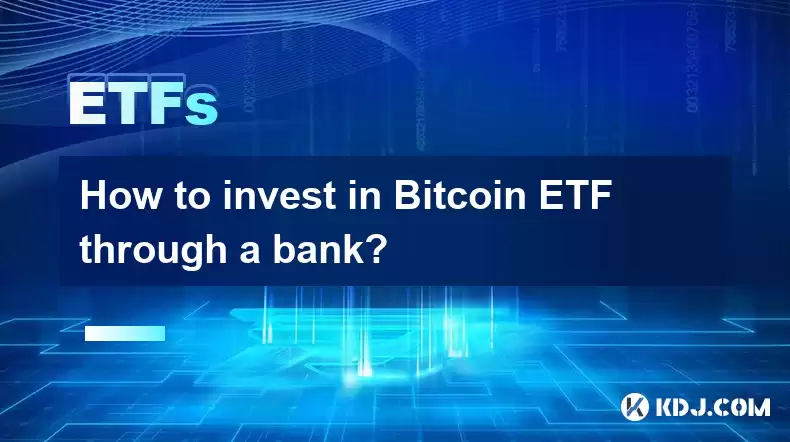
Understanding Bitcoin ETFs and Bank Involvement
Investing in Bitcoin directly involves navigating the complexities of cryptocurrency exchanges, managing private keys, and understanding the volatility inherent in the market. Bitcoin Exchange Traded Funds (ETFs) offer a potentially simpler route. These funds track the price of Bitcoin, allowing investors to gain exposure without directly holding the cryptocurrency. However, the availability of Bitcoin ETFs through traditional banks is still a developing area. Many banks are hesitant due to regulatory uncertainty and the perceived risks associated with cryptocurrencies.
The Current Landscape: Limited Direct Access
Currently, many banks do not directly offer Bitcoin ETF investments within their standard brokerage services. This is largely due to regulatory hurdles and the evolving nature of cryptocurrency regulation. Banks are cautious institutions, prioritizing compliance and risk mitigation. Therefore, finding a bank that directly offers Bitcoin ETF trading on its platform might prove challenging. The situation is constantly changing, so checking regularly with your bank is advised.
Indirect Investment Routes: Brokerages and Platforms
While direct access through a bank might be limited, there are indirect routes. Many brokerage firms, some affiliated with banks, do offer access to Bitcoin ETFs. These brokerages often have robust online platforms, allowing investors to buy and sell ETFs much like traditional stocks. It's crucial to research the brokerage's reputation, fees, and the specific Bitcoin ETFs they offer before investing.
Step-by-Step Guide to Investing Through a Brokerage
If you decide to use a brokerage, here's a potential process:
- Research Brokerages: Identify brokerages offering Bitcoin ETFs and compare their fees, security measures, and user experience.
- Open an Account: Complete the necessary paperwork and identity verification to open a brokerage account.
- Fund Your Account: Deposit funds into your brokerage account using your bank account or other methods.
- Search for Bitcoin ETFs: Locate the Bitcoin ETF ticker symbol (e.g., GBTC, BITO) within the brokerage's platform.
- Place an Order: Specify the number of shares you wish to purchase and execute the trade.
- Monitor Your Investment: Regularly track the performance of your Bitcoin ETF investment.
Understanding the Risks Involved
Investing in Bitcoin ETFs, even through a brokerage, carries inherent risks. The price of Bitcoin is notoriously volatile, meaning significant gains or losses are possible. It's essential to understand your risk tolerance before investing any amount you cannot afford to lose. Diversification across your investment portfolio is also a key strategy to mitigate risk.
Regulatory Considerations and Future Prospects
The regulatory landscape for cryptocurrencies is constantly evolving. New regulations and guidelines could impact the availability and accessibility of Bitcoin ETFs. Furthermore, the approval and listing of new Bitcoin ETFs will likely influence the market. Keeping up-to-date with regulatory developments is crucial for informed investment decisions.
Choosing the Right Bitcoin ETF
Different Bitcoin ETFs might employ different strategies, impacting their performance and fees. Some track the spot price of Bitcoin, while others may use futures contracts or other derivatives. Carefully compare the expense ratios and investment strategies of different ETFs before making a selection. Understanding the underlying methodology is vital for informed investment.
Tax Implications of Bitcoin ETF Investments
The tax implications of investing in Bitcoin ETFs will vary depending on your jurisdiction and individual circumstances. Capital gains taxes may apply upon selling your ETF shares, and these taxes can be significant, depending on the profit and your tax bracket. It's advisable to consult with a tax professional to understand the potential tax liabilities associated with your investment.
Security and Fraud Prevention
When investing in Bitcoin ETFs through a brokerage, it's crucial to prioritize security. Choose reputable brokerages with robust security measures to protect your funds and personal information. Be wary of scams and phishing attempts. Never share your login credentials or sensitive information with unsolicited parties.
The Role of Custodians in Bitcoin ETF Investing
Custodians play a vital role in ensuring the security of assets within Bitcoin ETFs. These custodians are responsible for safeguarding the Bitcoin held by the ETF. Choosing an ETF with a reputable custodian can help mitigate the risk of loss or theft. Investigating the custodian's track record and security protocols is a crucial step in due diligence.
Frequently Asked Questions
Q: Can I buy Bitcoin ETFs directly from my bank?
A: Currently, direct purchase of Bitcoin ETFs from most banks is not widely available. This is due to regulatory and risk management considerations. However, the situation is dynamic and may change in the future.
Q: What are the risks of investing in Bitcoin ETFs?
A: Investing in Bitcoin ETFs carries risks associated with the volatility of Bitcoin's price. Significant price fluctuations can lead to substantial gains or losses. Regulatory uncertainty also presents a risk factor.
Q: How do I find a brokerage that offers Bitcoin ETFs?
A: Research online brokerages. Many major brokerage firms now offer access to a selection of Bitcoin ETFs. Compare their fees, security measures, and user experience before choosing one.
Q: Are there any fees associated with investing in Bitcoin ETFs?
A: Yes, there are fees associated with Bitcoin ETF investing. These include brokerage fees, expense ratios charged by the ETF itself, and potentially other transaction costs.
Q: What are the tax implications of Bitcoin ETF investments?
A: The tax implications vary depending on your location and individual circumstances. Capital gains taxes may apply upon selling your ETF shares. Consult a tax professional for personalized advice.
Q: How can I protect myself from scams when investing in Bitcoin ETFs?
A: Only use reputable and regulated brokerages. Be wary of unsolicited investment offers and never share your login credentials or personal information with untrusted parties. Thoroughly research any brokerage before investing.
Disclaimer:info@kdj.com
The information provided is not trading advice. kdj.com does not assume any responsibility for any investments made based on the information provided in this article. Cryptocurrencies are highly volatile and it is highly recommended that you invest with caution after thorough research!
If you believe that the content used on this website infringes your copyright, please contact us immediately (info@kdj.com) and we will delete it promptly.
- Bitcoin Strategy: Saylor's Not Hoarding, He's Building an Empire
- 2025-08-02 22:30:12
- Bitcoin Bloodbath: Macro Pressures and Liquidations Unleash Crypto Chaos
- 2025-08-02 22:30:12
- Worldcoin, Identity, WLD Price: Decoding the NYC Crypto Buzz
- 2025-08-02 21:10:12
- Shiba Inu: Utility and Community Strength Drive Crypto's Evolution
- 2025-08-02 21:50:12
- Crypto Donations, Trump PAC, and Bitcoin: A New York Minute on Political Coin
- 2025-08-02 20:30:12
- Crypto Market Under Pressure: Bearish Momentum and Rising Volatility Take Hold
- 2025-08-02 20:30:12
Related knowledge
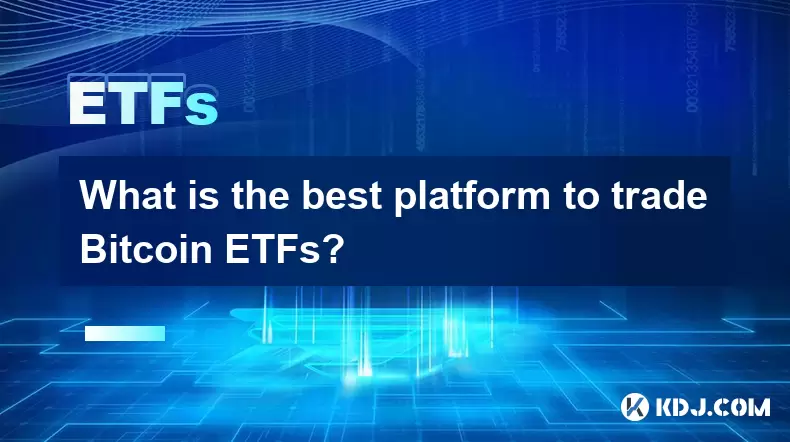
What is the best platform to trade Bitcoin ETFs?
Jul 23,2025 at 04:14am
Understanding Bitcoin ETFs and Their Role in TradingBitcoin Exchange-Traded Funds (ETFs) have gained significant traction among traditional and crypto...
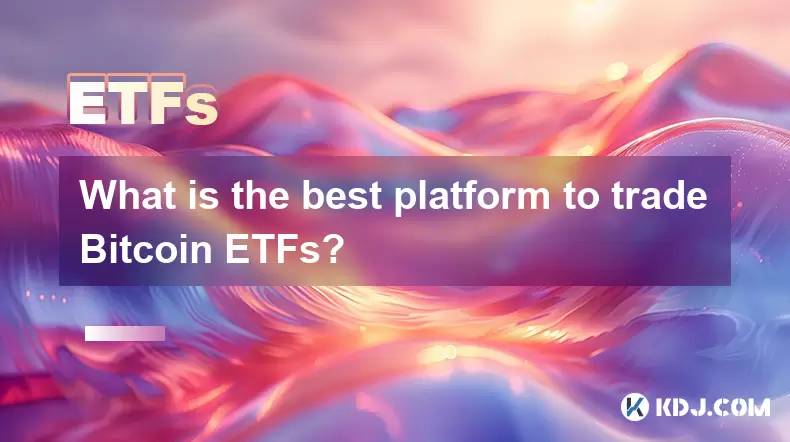
What is the best platform to trade Bitcoin ETFs?
Jul 17,2025 at 03:50pm
Understanding Bitcoin ETFs and Their Role in the MarketBitcoin Exchange-Traded Funds (ETFs) are investment vehicles that track the price of Bitcoin wi...
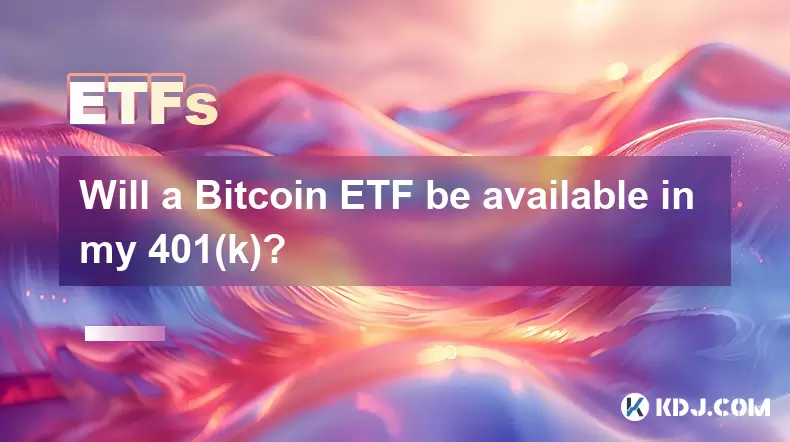
Will a Bitcoin ETF be available in my 401(k)?
Jul 17,2025 at 10:42pm
What is a Bitcoin ETF?A Bitcoin ETF (Exchange-Traded Fund) is an investment vehicle that tracks the price of Bitcoin without requiring investors to di...
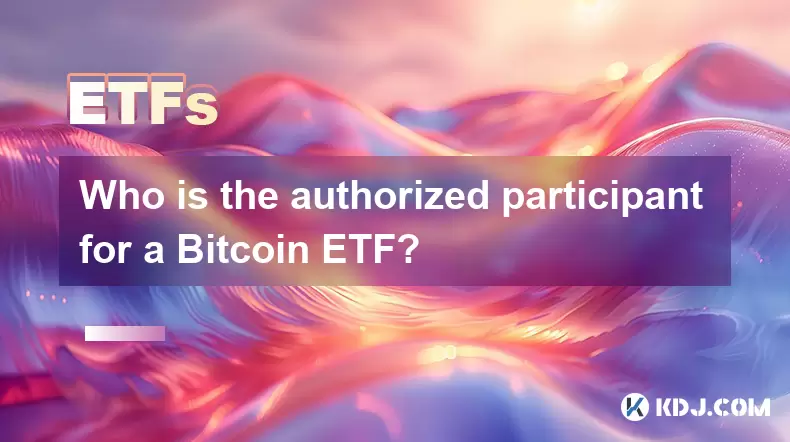
Who is the authorized participant for a Bitcoin ETF?
Jul 18,2025 at 12:42am
Understanding the Role of Authorized Participants in Bitcoin ETFsIn the context of Bitcoin Exchange-Traded Funds (ETFs), an authorized participant (AP...
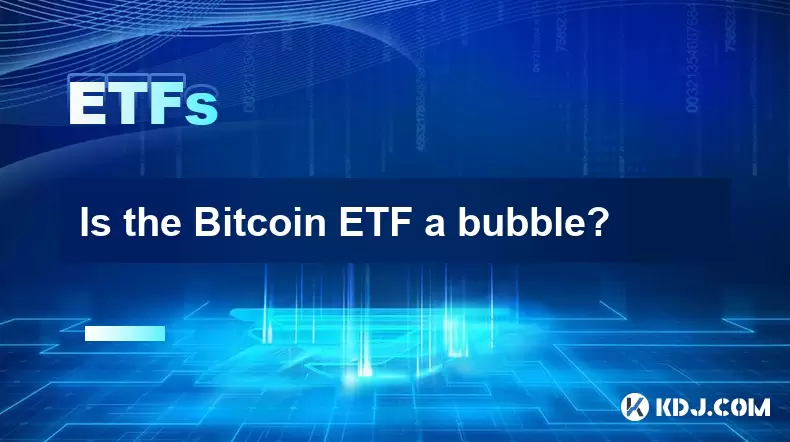
Is the Bitcoin ETF a bubble?
Jul 20,2025 at 06:57am
Understanding the Bitcoin ETF ConceptA Bitcoin Exchange-Traded Fund (ETF) is a financial product that aims to track the price of Bitcoin without requi...
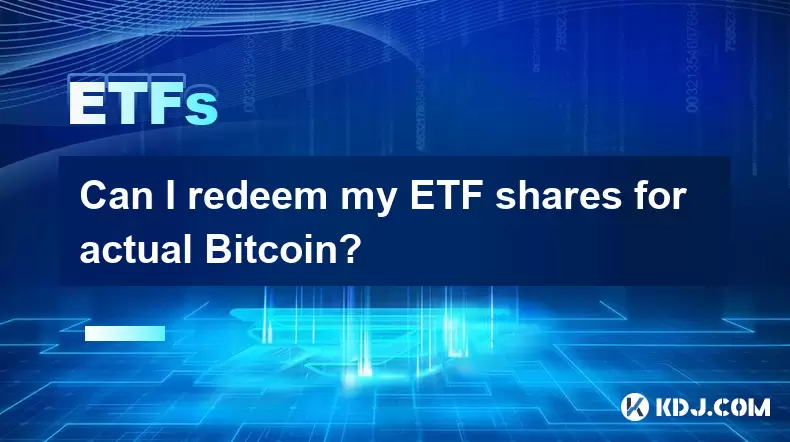
Can I redeem my ETF shares for actual Bitcoin?
Jul 17,2025 at 03:14pm
Understanding ETF Shares and Their Relation to BitcoinExchange-Traded Funds (ETFs) have become a popular investment vehicle for those looking to gain ...

What is the best platform to trade Bitcoin ETFs?
Jul 23,2025 at 04:14am
Understanding Bitcoin ETFs and Their Role in TradingBitcoin Exchange-Traded Funds (ETFs) have gained significant traction among traditional and crypto...

What is the best platform to trade Bitcoin ETFs?
Jul 17,2025 at 03:50pm
Understanding Bitcoin ETFs and Their Role in the MarketBitcoin Exchange-Traded Funds (ETFs) are investment vehicles that track the price of Bitcoin wi...

Will a Bitcoin ETF be available in my 401(k)?
Jul 17,2025 at 10:42pm
What is a Bitcoin ETF?A Bitcoin ETF (Exchange-Traded Fund) is an investment vehicle that tracks the price of Bitcoin without requiring investors to di...

Who is the authorized participant for a Bitcoin ETF?
Jul 18,2025 at 12:42am
Understanding the Role of Authorized Participants in Bitcoin ETFsIn the context of Bitcoin Exchange-Traded Funds (ETFs), an authorized participant (AP...

Is the Bitcoin ETF a bubble?
Jul 20,2025 at 06:57am
Understanding the Bitcoin ETF ConceptA Bitcoin Exchange-Traded Fund (ETF) is a financial product that aims to track the price of Bitcoin without requi...

Can I redeem my ETF shares for actual Bitcoin?
Jul 17,2025 at 03:14pm
Understanding ETF Shares and Their Relation to BitcoinExchange-Traded Funds (ETFs) have become a popular investment vehicle for those looking to gain ...
See all articles

























































































